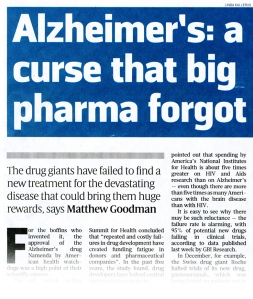The following is a blog from our newest recruit – Sarah Galvin, Account Executive
Since the turn of the year, a fresh wave of holiday deals and diet plan advertisements have been assailing us. However, one ad I didn’t expect to see is for personal genomic testing and analysis, supplied by the Californian company 23andMe, for only £125. Marketed as a gene test for over 100 health conditions and traits, it uses a saliva sample to help interpret the unique mutations in your genetic make-up. Based on these results, it’s possible to identify if there is an increased risk of developing certain conditions and predict the efficacy of various medicines, thereby enabling you to adjust your behaviour accordingly. Additionally, you can view your lineage (ancestry and family tree plotting) and also have the option to allow your data to be used for further scientific research to help others.
At first, the scientist in me was impressed because I support the idea of personalised treatment choices based on your own specific genetic information. This is essentially what 23andMe can help with, but with varying degrees of detail. When I looked closer at the specific genes chosen to test for a given condition/trait, I was excited to recognise a few. Clear explanations were given for why these genes were picked with evidence from reputable research articles to back it up. I see how the 23andMe test would appeal to human curiosity but the interpretation of data needs to be considered carefully. 23andMe states that ‘a combination of genes with well-known associations’ are covered in the test, as well as some more recent discoveries. However, this does not cover all possibilities; there is no certainty that you will develop any disease even if you test positive for an associated gene. Genetics is a complex science and it is known that environmental and lifestyle events affect the presentation (of phenotype) in varying degrees of severity. There is potential for results to cause unnecessary anxiety over small increased risks; for example, unnecessary prophylactic surgery for cancer.
However, some productive decisions about your health can be made. For example, if you are lactose intolerant, you avoid cheese. If you and your partner are both carriers for a specific inherited condition, you can get further advice from a genetic counsellor. Other traits are just plain quirky: caffeine metabolism; response to diet; earwax type; hair curl/colour/thickness; finger length ratio – the list goes on.
Comments from consumers during feedback suggest an interest in tracking their genetic ancestry and where their DNA has travelled on a global scale. Both maternal and paternal lineages can be traced, although this has been noted to be quite vague. Another global feature finds relatives (who have also taken the 23andMe test) with a certain percentage of DNA similarities. There are stories that this has helped with reuniting adopted families, which could be a double-edged sword if family members don’t want to be found. It may also provide false hope for adoptees if they don’t find what they looking for, or you find out you’re related to someone in a way you didn’t expect.
Not only your reaction to the results should be considered, but also what the company does with your data once the test is complete. All data is kept on a ‘secure’ server and you receive your results through an online platform. As we are constantly reminded by the media, how safe are you really online? The 23andMe privacy policy states certain products/services can be sold to you in relation to your results. They admit to sharing aggregate information about users’ genomes to third parties as long as users ‘cannot be reasonably identified’. However, there is a potential for future developments in policy to allow insurance or pharmaceutical companies to better sell their services, or deny them completely leading to genetic discrimination. In this case, how can the consumer receive guaranteed security when it comes to handling the sensitive data our life is based on? Who should draw the line over how our data is used?
All in all, I see the potential in this growing area of scientific research and therapeutic discovery. It is coming on in leaps and bounds. For now I believe it to be in its infancy with issues that need to be addressed if it becomes standard practice. This test is currently an optional service, which could make sharing your results with loved ones (however it may impact them) a tricky decision. I keep finding myself asking: do the benefits outweigh the risks? You have the opportunity to adjust your behaviour towards a healthier lifestyle specific to yourself, but with the potential for misuse once your sensitive information is on record. Tighter guidelines would need to be developed, but by who? I will be watching with interest as to how this will evolve.


